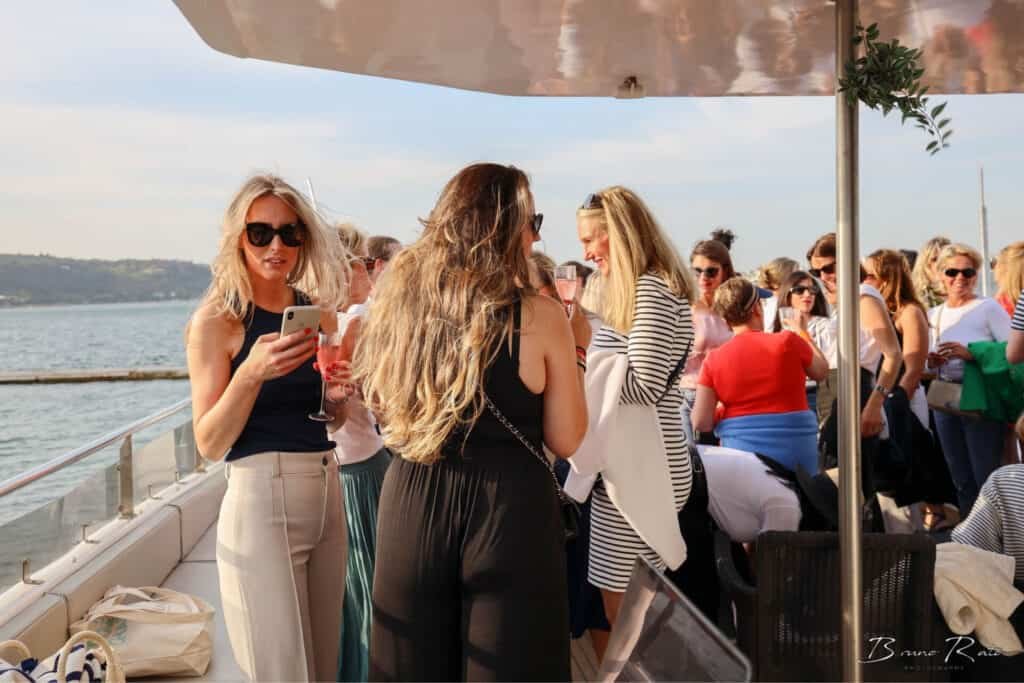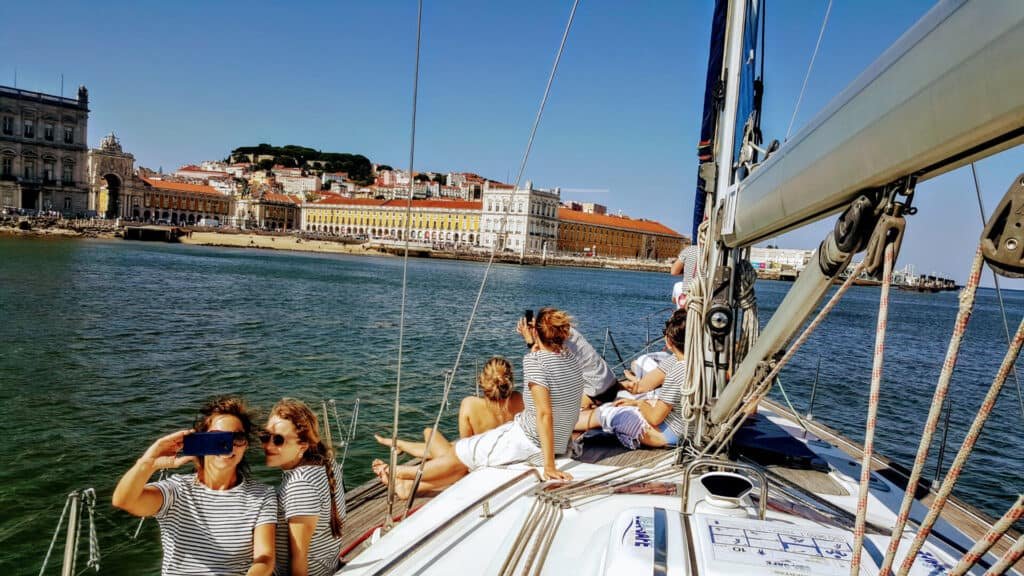Desde a histórica Torre de Belém até à bela baía de Cascais encontra vários cenários perfeitos para uma emocionante regata na região de Lisboa. O importante é haver vento e vontade de participar numa experiência memorável.
A brief history of regattas in Portugal
Initially, during the Age of Discovery, regattas were organized to test the speed and maneuverability of boats. These races attracted the attention of many spectators and were already known as the “galleon races”.
In 1892, the Lisbon Naval Club was founded. At this time there was a strong growth in the popularity of water sports, especially regattas. Since then, they have become an important part of Lisbon’s maritime culture. Today, regattas are held regularly all over the country and attract visitors from all over the world.
What is a regatta anyway?
A regatta is a competition between sailboats trying to complete a given course in the shortest possible time. In order to achieve this goal, boats need to adjust their sails properly to get the most out of the wind. Rapidly changing winds can create additional challenges, requiring sailors to adapt quickly.
Race organizers usually monitor the wind conditions on the Tagus River before and during the event to ensure the safety of the participants and adjust the course if necessary. These courses are defined with buoys and set by the race committee (umpires).
In these competitions, the boats are separated into classes and the number of crew members can also vary. It is suitable for all ages, whether experienced or just curious about this area.
At the end of a race, an imaginary finish line is usually set between a buoy and a small (race committee) boat. After passing the “line”, the umpires sound a horn to end the sailboat’s race, noting the time taken during the race.


Correlation between boat and company
There are many similarities between a boat and a company. It’s easy to understand the analogy. And it’s even easier to draw lessons for the business world.
Let’s start at the beginning. Companies have objectives. So does a boat trip. Usually to reach a destination within a certain period of time. Preferably sailing through calm waters with few bumps in the road. To do this, you have to define a strategy, set a course and have an action plan. Just like companies, which also set objectives (quantitative and qualitative), as well as strategies, tactics and timetables.
Organizations systematically seek information about the context in which they operate in order to make better decisions. For example, socio-economic, political-legal, technological, cultural, competition, consumer behavior, etc. information. Those who govern ships also seek contextual information about their environment. Questions such as “what the weather will be like in the next few days/hours”, “is the current/tide for or against”, “which way is the wind blowing and how strong is it”, “is there a storm on the horizon”, etc. These are all examples of external variables that need to be monitored. Let’s remember that this is where opportunities and threats lie.
…


Obviously, there are external variables that we can’t control. The outbreak of a pandemic or the start of a war are clear examples of this. So is a stronger gust of wind, a bigger wave or a tsunami. And that implies the need to adapt.
” Who goes to sea gets washed ashore”, a popular Portuguese saying that reminds us of the importance of planning before the journey begins. Before a boat begins its journey, meticulous planning is undoubtedly essential. This includes checking the condition of the vessel, the weather, the route and the provisioning of supplies. In the same way, a company must plan ahead. This involves market analysis, preparing strategies, acquiring resources and ensuring that all aspects are ready to face the challenges that the market may present.
To ensure safe navigation, the boat must have a solid structure. Similarly, a company also needs a solid organizational structure and a healthy financial base in order to survive.
Finally, communication. Communication is another key aspect of coordinating a crew’s actions. Just as in companies, internal and external communication is vital to ensure that everyone is aligned with their objectives and to meet the needs of customers.
Have you ever thought about taking part in a regatta on the Tagus?
Organizing a regatta on the Tagus River is a task that requires knowledge of the waters and local conditions. Our team has passionate and knowledgeable specialists in the field, ensuring that every detail is taken care of with the utmost attention. From selecting the ideal course to managing logistics, we are prepared to offer an unparalleled experience.
The safety of participants is our priority. We have modern, safe boats and a certified team capable of dealing with any eventuality. We also keep a close eye on the weather and other variables to ensure a safe and enjoyable environment.
With a combination of local knowledge, nautical experience and passion for the sea, we are ready to create a personalized regatta that meets all your expectations.


Organize a regatta with us
In short, regattas on the Tagus offer an exciting experience for both sailors and spectators. They are part of an ancient tradition that brings the River Tagus to life. Thanks to the stunning scenery provided by our coastline and the very frequent existence of “good winds”, Lisbon is a popular destination for regattas in Portugal.
Don’t miss out on the opportunity to create incredible memories. By choosing us to organize your regatta on the Tagus River, you are opting for excellence, safety and dedication. Contact us to plan your regatta and find out more about our budget and conditions. Let us show you why we are the best choice for adventures on the River Tagus!


